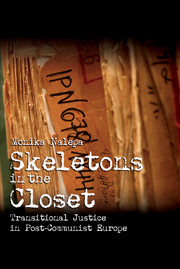Book contents
- Frontmatter
- Contents
- List of Figures
- List of Tables
- Acknowledgments
- List of East Central European Political Organizations
- 1 INTRODUCTION
- Part I Skeletons in the Closet
- Part II Out of the Closet
- 9 EPILOGUE: BETWEEN AGENTS AND HEROES
- Appendix A Mathematical Proofs to Chapter 3
- Appendix B Answers of MPs and Their Constituents to “More Should Be Done to Punish People Who Were Responsible for the Injustices of the Communist Regime”
- Appendix C Sampling Technique and Transitional Justice Survey Questionnaire
- Appendix D Birth and Death of Parliamentary Parties by Their Position Regarding Lustration
- Appendix E Mathematical Proofs to Chapter 7
- Appendix F Lustration Laws by Target, Targeted Activity, and Sanction Type in Poland, Hungary, and the Czech Republic
- Bibliography
- Index
- Titles in the series
Part II - Out of the Closet
Published online by Cambridge University Press: 05 June 2012
- Frontmatter
- Contents
- List of Figures
- List of Tables
- Acknowledgments
- List of East Central European Political Organizations
- 1 INTRODUCTION
- Part I Skeletons in the Closet
- Part II Out of the Closet
- 9 EPILOGUE: BETWEEN AGENTS AND HEROES
- Appendix A Mathematical Proofs to Chapter 3
- Appendix B Answers of MPs and Their Constituents to “More Should Be Done to Punish People Who Were Responsible for the Injustices of the Communist Regime”
- Appendix C Sampling Technique and Transitional Justice Survey Questionnaire
- Appendix D Birth and Death of Parliamentary Parties by Their Position Regarding Lustration
- Appendix E Mathematical Proofs to Chapter 7
- Appendix F Lustration Laws by Target, Targeted Activity, and Sanction Type in Poland, Hungary, and the Czech Republic
- Bibliography
- Index
- Titles in the series
Summary
Let us go back to Table 1.1. It is clear from the data presented there that throughout East Central Europe, lustration laws eventually did get adopted. Although the communists were able to shield themselves from transitional justice long enough to establish successful social democratic parties, toward the end of the 1990s lustration became the norm rather than the exception. This is not incompatible with my theory from the first part of the book. All that the skeletons model explained was that lustration will not get adopted by dissidents who suspect they are infiltrated with secret police agents. I argued that such fear is particularly widespread among dissident groups who actively participated in the roundtable negotiations. Furthermore, I argued that the communists were more likely to negotiate with those whom they had more information about and whom they could hold hostage to the threat of skeletons in the closet. Clearly, however, the communists' insurance device in the form of dissident infiltration could only last for a limited time. In transitions to democracy, one cannot be certain to whom exactly power is being transferred. In one of the most concise definitions of democracy – Adam Przeworski's minimalist definition – democracy is characterized as a “system where rulers lose elections” (Przeworski 1999). To be more precise, it is a system where the rulers can lose elections.
- Type
- Chapter
- Information
- Skeletons in the ClosetTransitional Justice in Post-Communist Europe, pp. 97 - 98Publisher: Cambridge University PressPrint publication year: 2010



